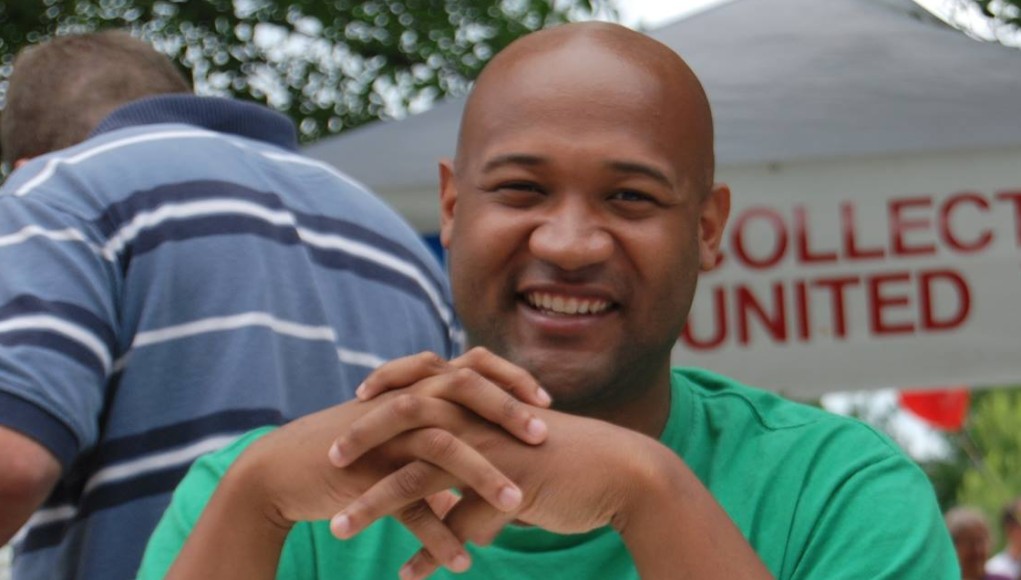Mike Martez Johnson is co-chair of Progressive Dane, and a member of the board of directors of Madison365.
- Rank your Top 5 MCs Nas, Guru, Vast Aire, Freddie Gibbs, Andre 3000. Honorable Mention, The DOC.
- Which motivates you more: doubters or supporters? Supporters. I feed off positive energy more than negative energy, although there is something about running your doubters off the field that I do get a kick out off.
- Do you prefer being called Black or African American? African-American, although when the moment calls for it…
- What three leaders in Madison under 50 have impressed you the most? County Supervisor Heidi Wegleitner for her tenacious truth seeking, the young people of YGB for their powerful, in your face work, and Sofia Snow from UW-Madison Multicultural Arts Initiatives, for her ability to inspire through education.
- What’s the biggest stumbling block in Madison to turning the corner on our racial disparities? The way we talk about them; As Ta-Nehisi Coates stated in Madison during his recent lecture, “Racism is not a disease of the heart, but the pocketbook.” Our race conversations are leaned in the direction of the individual and the personal, which has a place in conversations about humanity and acknowledging one’s humanity. What is missing is an economic component that looks closely at how our public and private institutions operate at the expense of communities of color. The lack of affordable housing in Madison’s communities of color, for example, can’t be easily explained as the mere outcome of racism, but as an intentional refusal to use local resources in poor black neighborhoods because they are poor.
- What are your top three priorities at this point in your life?
Personal: Finish school
Professional – Significantly increase affordable housing here in Dane County
Irreverent – Bring a George Webb to Madison - Why should a person of color become a progressive Dane member, as opposed to a Democrat or Republican? Republicanism specifically, and conservatism generally, offer nothing for people of color of note so let’s just push that off the table.I will note that I have a lot of friends and allies within the Democratic party, and more often than not, vote for Democrats on my ballots. (Granted, we have been blessed here in Dane County with a number of great ones). The issue is, elements of the modern Democratic party operate so much against the interest of working people, either by indifference or enabling systems that perpetuate disparities.
With that said, I believe that Progressive Dane offers a place and a set of principles that people of color are naturally drawn to, a commitment to social justice and economic justice that isn’t about tinkering around the margins, but forceful and passionate challenges to entrenched powers and policies wherever they are. I am proud of Progressive Dane’s history of supporting and nurturing leaders of color from Brain Benford to Leland Pan to Samba Baldeh.
- The perception is that progressives cities are good places to live for people of color. The racial equity study shows people of color are not doing well here in Madison. As a progressive, why do you believe people of color are not thriving here? Look at how many resources, how much energy are being dedicated to building a hotel and private parking with city resources, and then compare that to how many city resources are being dedicated to decreasing homelessness, increasing affordable housing, creating family supporting jobs, or hell, even having a discussion about pivoting our development and investments to empower communities of color to create and build on their own. A lot of what I see in Madison goes beyond black and white; it’s about the green.
My roommate also offered his own thoughts –
“Gentrification, importing new people instead of investing in the people already here, isolating black people from resources on the south side, and brunch. Always brunch.” - What are your three favorite books? Class Notes by Adolph Reed, Raising Expectations and Raising Hell by Jane McAlevey, and The Shock Doctrine by Naomi Klein
- Being from Milwaukee, do you find the same challenges for African Americans in Madison the same as Milwaukee? I would say the issues are similar but because Milwaukee has a black population made of working class and middle class folks with investments and commitments with the public sector – in contrast to Madison which largely has a middle class black community more involved in non-profits – the way issues are approached is different. For example, while a lot prominent black folks back charter schools, in places like Milwaukee, Chicago, etc it is more common that the black community will oppose diverting resources from public schools to support charters. In terms of solutions I think Milwaukee thinks more broadly about empowering black people in general, while in Madison I get a sense that a lot of energy goes to empowering educated upwardly mobile black folka.
- Who were the top five presidents of all time?
FDR – New Deal
Lyndon Johnson – The Great Society, civil rights Legislation
Abraham Lincoln – Emancipation Proclamation, 13th Amendment
Eisenhower – Interstate Highway System, Warned against the corporate takeover of government, maintained many New Deal programs
Ulysses Grant – Reconstruction era laws, civil rights, “better than most” on Native American relations - What three songs would you consider theme songs for your life?
Semi-Charmed Life by Third Eye Blind
After School by Dom Kennedy
We Gonna Make It by Jadakiss and Styles P




























